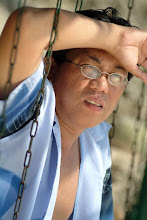 We're all alone, avers a song. But now that connectivity is just at the tip of our fingertips in this Age of the Internet, isolation takes a common and ironic turn.
We're all alone, avers a song. But now that connectivity is just at the tip of our fingertips in this Age of the Internet, isolation takes a common and ironic turn.Along that line goes the gist of one of my recent columns "So To Speak" in the op-ed page of Sun.Star Cebu (April 24, 2008). Hereunder is the reprint:
Sharing our story
BLOOD boiled up to their eyes. Upset by the ugly comments about them in their classmate's blog, eight high school students in Florida are now facing charges after they reportedly battered the poor young lady and left her almost unrecognizable.
Such blind rage, indeed, after they felt belittled in her MySpace page. What an oversight for her as well to have raised an eyebrow, looking for trouble by seeing other people in a bad light. In the netherworld of “nada” where one is degraded or rendered insignificant, invisible.
Who wants to be written off into the ignominy of anonymity? Not those who admitted to have Googled themselves at some point in their lives. They comprise almost half of the respondents (47 percent) in a recent survey by the Pew Internet and American Life Project that aims "to produce reports that explore the impact of the Internet on families, communities, work and home, daily life, education, health care, and civic and political life."
One's sense of self, in this age of Net surfing, can either sink or stay above water. "I Google myself to see what kinds of waves my life is making in the world," affirms travel writer Frank Bures in the latest edition of Poets and Writers Magazine. "Isn't that why writers, artists, and other egomaniacs obsess over the Amazon ranking of their book, the comments on their blogs, the hits on their websites?"
 Almost desperate, what seems an emergency to make our presences felt—upending our universal isolation---in the grand scheme of technology. In this digital world, the democracy of bloggers and YouTube uploaders means never having to say sorry. Particularly in a pell-mell attempts at autobiography, a puny and slapdash binge at shaping some moments—no matter how trivial, or utterly devoid of larger-than-life hallmarks of heroism—against the flux called history.
Almost desperate, what seems an emergency to make our presences felt—upending our universal isolation---in the grand scheme of technology. In this digital world, the democracy of bloggers and YouTube uploaders means never having to say sorry. Particularly in a pell-mell attempts at autobiography, a puny and slapdash binge at shaping some moments—no matter how trivial, or utterly devoid of larger-than-life hallmarks of heroism—against the flux called history.
Never mind if one can't cast one's words in gold with the touch of a Resil Mojares, who laments the lack of memoirs and autobiographies. "Since people do not leave behind written accounts of their lives, we miss out on a lot of the personal, human details of how larger histories are made," explains Mojares at the book launching of "Shapes of Memory," the biography of Cebuano labor leader and trade unionist Democrito T. Mendoza.
Sweat the small stuff, baby. "Little things can lead you to big events…," attests Mendoza, explaining the necessity "to write the details of his life…to encourage young people to face challenges and be ready to risk everything to achieve a better life." For a broad base of contacts, Mendoza might try to open a Multiply account.
Uploading himself at YouTube for a wider audience of his inspiring tale, however, might be a strain for him. He won't stand a chance, no matter how noble he is, compared to the almost extra-terrestrial dimensions of human condition shown in the unlimited scope of its videos.
It's where one can spot, for instance, a perfume canister stuck into someone's rectum. And how the victim ends up literally the butt of jokes, sprawled in the surgery room as the cameras zoom into the twilight zone of his anatomy. Behold the sharp edges of laughter cutting him to pieces, piercing us who witness into complicity. So much for a shared story.
Such blind rage, indeed, after they felt belittled in her MySpace page. What an oversight for her as well to have raised an eyebrow, looking for trouble by seeing other people in a bad light. In the netherworld of “nada” where one is degraded or rendered insignificant, invisible.
Who wants to be written off into the ignominy of anonymity? Not those who admitted to have Googled themselves at some point in their lives. They comprise almost half of the respondents (47 percent) in a recent survey by the Pew Internet and American Life Project that aims "to produce reports that explore the impact of the Internet on families, communities, work and home, daily life, education, health care, and civic and political life."
One's sense of self, in this age of Net surfing, can either sink or stay above water. "I Google myself to see what kinds of waves my life is making in the world," affirms travel writer Frank Bures in the latest edition of Poets and Writers Magazine. "Isn't that why writers, artists, and other egomaniacs obsess over the Amazon ranking of their book, the comments on their blogs, the hits on their websites?"
 Almost desperate, what seems an emergency to make our presences felt—upending our universal isolation---in the grand scheme of technology. In this digital world, the democracy of bloggers and YouTube uploaders means never having to say sorry. Particularly in a pell-mell attempts at autobiography, a puny and slapdash binge at shaping some moments—no matter how trivial, or utterly devoid of larger-than-life hallmarks of heroism—against the flux called history.
Almost desperate, what seems an emergency to make our presences felt—upending our universal isolation---in the grand scheme of technology. In this digital world, the democracy of bloggers and YouTube uploaders means never having to say sorry. Particularly in a pell-mell attempts at autobiography, a puny and slapdash binge at shaping some moments—no matter how trivial, or utterly devoid of larger-than-life hallmarks of heroism—against the flux called history.Never mind if one can't cast one's words in gold with the touch of a Resil Mojares, who laments the lack of memoirs and autobiographies. "Since people do not leave behind written accounts of their lives, we miss out on a lot of the personal, human details of how larger histories are made," explains Mojares at the book launching of "Shapes of Memory," the biography of Cebuano labor leader and trade unionist Democrito T. Mendoza.
Sweat the small stuff, baby. "Little things can lead you to big events…," attests Mendoza, explaining the necessity "to write the details of his life…to encourage young people to face challenges and be ready to risk everything to achieve a better life." For a broad base of contacts, Mendoza might try to open a Multiply account.
Uploading himself at YouTube for a wider audience of his inspiring tale, however, might be a strain for him. He won't stand a chance, no matter how noble he is, compared to the almost extra-terrestrial dimensions of human condition shown in the unlimited scope of its videos.
It's where one can spot, for instance, a perfume canister stuck into someone's rectum. And how the victim ends up literally the butt of jokes, sprawled in the surgery room as the cameras zoom into the twilight zone of his anatomy. Behold the sharp edges of laughter cutting him to pieces, piercing us who witness into complicity. So much for a shared story.

























































No comments:
Post a Comment